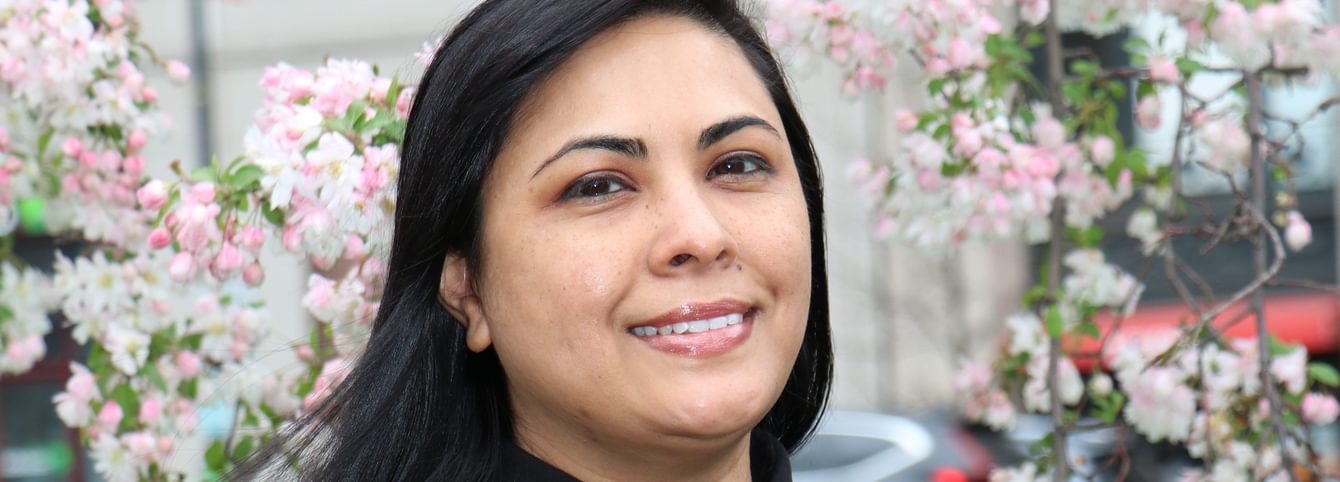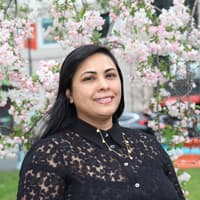Nayla Huq
Nayla Huq is an alumna of the 2021 CLS Indonesian Program hosted virtually by Universitas Negeri Malang in Malang, Indonesia. She is a third-year Sociology PhD student at Stony Brook University. The ability to communicate in Bahasa Indonesian has become central to Nayla’s academic and career goals. After completing her PhD, Nayla plans to continue to research and teach on the topics of Indonesian culture, history, political economy, and environmental activism.
Getting to Know Nayla
I was born in Bangladesh, briefly lived in Germany with my parents as an infant, then we emigrated to Los Angeles before my third birthday. I was already learning to speak multiple languages at this early age: Bangla, Urdu, German, and English. I grew up in Los Angeles in a multilingual home. My mom and I spoke Bangla, my dad spoke Urdu to me, but being a rebel, I decided that I would speak back to him in English. He suddenly switched to Bangla after my brother was born, but I stuck to speaking to him in English. I went to UCLA for undergrad where I majored in English, and took courses in Spanish, French, and Italian. Having grown up multilingual, I easily took to new languages, and I wished to learn all of the Romance languages.
I eventually found my intellectual home in Sociology, then pursued my MA at Cal State Northridge, focusing on social movements. From the great state of California to the great state of New York, I am now a non-traditional PhD student studying Sociology at Stony Brook University.
Future Goals
I plan to become a professor, engaging in research and teaching. Through research, I hope to become an area expert in Indonesian social movements, political economy, and environmental issues. Speaking Bahasa Indonesia, I can communicate with individuals working in rural settings who directly experience environmental impacts, with grassroots and professional activists working to bring about change, and with policy experts and academics to gain a deeper understanding of related issues, processes, and debates. These conversations and discussions will be the data for my research. Being able to read in Bahasa Indonesia, I will be able to read news articles on current events, along with academic and policy papers and reports to conduct my research. Translations are limited. Having cultural understanding enables one to have a deeper and clearer sense of the subject. In the courses I teach, my students will also learn about Indonesian culture, history, political economy, and environmental activism.
Comparing Cultural Traditions—Weddings, Quiceaneras and More
With my original language partner, we discussed everyday life and cultural practices in Indonesia and the U.S., including different holidays, traditions, and how people celebrate them. I was particularly interested in learning about Indonesian weddings because, as a South Asian, we have exciting and elaborate weddings. I wanted to see how Indonesian weddings compare. My language partner gave a presentation showing the rituals, dress, and customs for a wide variety of groups across all the islands and elaborated on how the practices differ. I also presented on American weddings, South Asian weddings, and discussed quinceañeras, which were a significant part of my life having grown up in Los Angeles. With my community at home, I shared information on Indonesian cultural practices in daily life, especially how they show respect to elders, and their wide-ranging practices and dress for weddings across the islands.
Why More People Should Learn Indonesian
I would absolutely recommend that more people learn to speak Bahasa Indonesia! We live in a globalized world, so learning to speak any foreign language is a boon in and of itself. Learning to speak Bahasa Indonesia, specifically, is highly advantageous as Indonesia continues to rise in international affairs. The U.S. historically has had strong relations with Indonesia, which continue to develop, but information about this country is not as widely known in the general public, which presents future learners with many opportunities. I think it is also important to remember that Indonesia is paradise. Speaking the language will facilitate travel to this archipelago nation abundant in natural beauty and rich in cultural traditions.
Words of Advice
To students considering CLS, I would say: Do it! It is an amazing experience! The instructors are very skilled at teaching and keeping students engaged, and you learn about one year’s worth of language instruction within eight weeks. I would tell prospective CLS students to spend quality time on their applications, writing multiple drafts of their essays, receiving and addressing useful feedback on them, and really taking into account that the purpose of the program is to promote cultural exchange. Their pursuit of language instruction and cultural immersion should be part of their long-term goals.



